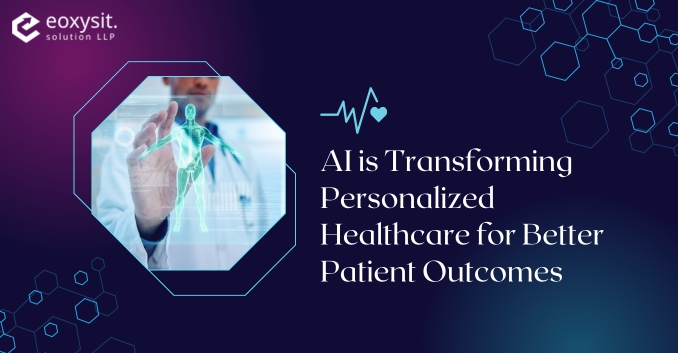
AI is Transforming Personalized Healthcare for Better Patient Outcomes
Preventive and precision medicine is the future of healthcare systems, focusing on individualized patient care. This approach considers heredity, habits, and past treatment experiences to provide better healthcare solutions. Artificial Intelligence (AI) plays a crucial role in driving this transformation, offering data-driven decisions that improve precision, speed, and efficacy. AI enhances healthcare delivery by optimizing planning, diagnosis, and treatment, ultimately improving patient outcomes.
Key Applications of AI in Personalized Healthcare
Predictive Analytics for Disease Prevention
AI utilizes genetic, lifestyle, and historical data to predict disease risks, allowing individuals to make proactive healthcare decisions. For example, AI assesses risks for complex conditions like diabetes and cardiovascular diseases, facilitating early prevention measures. This predictive capability can significantly reduce disease prevalence and severity.
AI-Powered Diagnostics
AI excels in medical imaging analysis, interpreting MRIs, X-rays, and other scans faster and more accurately than manual evaluations. By detecting patterns that might be missed by human specialists, AI ensures accurate and timely diagnoses, leading to early treatment and improved patient outcomes.
Customized Treatment Plans
AI personalizes treatment by analyzing patient health records and monitoring data. It recommends appropriate drug dosages and therapy combinations for optimal results while minimizing side effects. This tailored approach enhances treatment efficiency and patient well-being.
Remote Patient Monitoring
Wearable AI-powered devices continuously track health metrics such as heart rate and glucose levels in real-time. These devices alert healthcare providers to critical changes, enabling timely interventions. Remote monitoring promotes proactive patient care and better chronic disease management.
Genomic Data Analysis
AI accelerates the processing of genetic data, paving the way for precision medicine. By identifying links between genes and diseases, AI facilitates gene-based treatments and targeted therapies, ensuring more effective and personalized healthcare solutions.
Benefits of AI in Personalized Healthcare
AI enhances diagnostic accuracy and supports informed decision-making for healthcare professionals. Real-time patient monitoring enables preventive care, reducing healthcare costs and improving overall patient outcomes. AI-driven innovations lead to more effective and accessible healthcare services.
Challenges and Ethical Considerations
Despite its benefits, AI in healthcare faces challenges. Protecting patient data privacy is crucial, and AI models must be free from biases to ensure fair treatment across diverse populations. Ensuring equitable access to AI-powered healthcare solutions remains a significant challenge in the industry.
Future Trends in AI and Personalized Healthcare
The future of AI in personalized healthcare looks promising. Advancements in wearable health technology will enable real-time health tracking. AI-driven drug discovery will accelerate treatments for rare diseases. Virtual AI health assistants will enhance patient interactions by providing medical information and scheduling appointments.
The Bottom Line
AI is revolutionizing personalized medicine by enhancing diagnostics, treatment, and patient engagement. When implemented effectively, AI can make premium healthcare services more efficient and accessible, ultimately improving global health outcomes.



